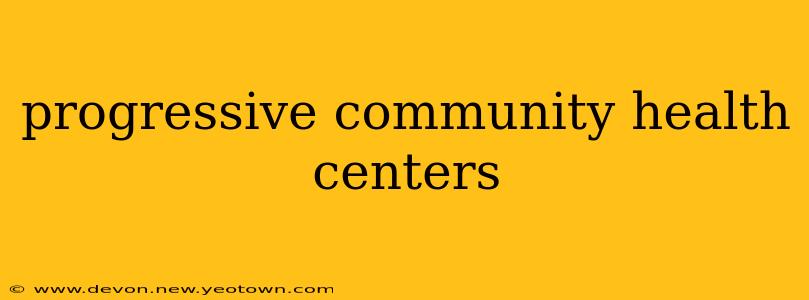The air hung heavy with the scent of antiseptic and hope. Inside the brightly painted walls of the Westside Community Health Center, a different kind of medical narrative was unfolding. This wasn't the sterile, impersonal environment often associated with large hospital systems. This was a place where care felt personal, accessible, and deeply rooted in the community it served. This is the story of progressive community health centers, and how they're revolutionizing healthcare access for underserved populations.
It began, like many transformative movements, with a simple, yet profound, need. Decades ago, communities across the nation grappled with a stark reality: a significant portion of their population lacked access to affordable, quality healthcare. Existing systems often failed to reach those most in need – individuals facing economic hardship, geographic isolation, or systemic barriers to care. From this fertile ground of unmet need, community health centers blossomed.
What are Progressive Community Health Centers?
Progressive community health centers are non-profit organizations dedicated to providing comprehensive, affordable healthcare services to everyone, regardless of their ability to pay. They are more than just clinics; they are community anchors, woven into the fabric of the neighborhoods they serve. Their progressive nature lies in their commitment to holistic care, addressing social determinants of health alongside medical needs. This means tackling issues like food insecurity, housing instability, and lack of transportation – factors that profoundly impact health outcomes.
How do Progressive Community Health Centers Differ from Traditional Healthcare?
Unlike traditional healthcare models focused on individual profit, community health centers prioritize community well-being. They operate on a sliding-fee scale, ensuring that cost isn't a barrier to accessing crucial medical services. Their commitment to comprehensive care extends beyond basic medical services. Many offer:
- Behavioral health services: Addressing mental health needs, often intertwined with physical health concerns.
- Dental care: Providing preventative and restorative dental services.
- Substance abuse treatment: Offering support and resources to individuals struggling with addiction.
- Health education and preventative care: Empowering individuals to take control of their health through education and proactive measures.
- Social services: Connecting patients with resources for housing, food, transportation, and other essential needs.
What Services do Progressive Community Health Centers Offer?
This is where the true impact of progressive community health centers becomes apparent. Let's delve into the specific services they offer:
Do Community Health Centers Offer Dental Services?
Yes, many progressive community health centers offer comprehensive dental care, including preventative services like cleanings and exams, as well as restorative treatments like fillings and extractions. Access to dental care is often a significant hurdle for underserved populations, making this a vital component of their mission.
Do Community Health Centers Provide Mental Health Services?
Absolutely. Recognizing the inextricable link between physical and mental health, progressive community health centers often integrate behavioral health services into their care model. This can include therapy, counseling, medication management, and psychiatric services.
What is the Cost of Care at a Community Health Center?
Community health centers operate on a sliding-fee scale, meaning the cost of care is adjusted based on a patient's income and ability to pay. No one is turned away due to inability to pay. They often accept Medicaid, Medicare, and other government insurance programs, as well as private insurance.
What are the Eligibility Requirements for Community Health Centers?
Eligibility requirements vary slightly depending on the specific community health center. However, generally, they serve anyone who lives within their service area and needs care, regardless of their income, insurance status, or immigration status. Many prioritize serving low-income and uninsured individuals.
The Ripple Effect: Transforming Communities
The impact of progressive community health centers extends far beyond individual patients. They serve as economic engines for their communities, creating jobs and boosting local economies. They are catalysts for health equity, addressing systemic disparities and creating a more just and equitable healthcare system. Their story is a testament to the power of community-based solutions and a beacon of hope for a future where healthcare is a right, not a privilege.
The next time you hear about healthcare disparities or access challenges, remember the tireless work of progressive community health centers. They are the unsung heroes, quietly transforming lives and building healthier, more equitable communities, one patient at a time.

